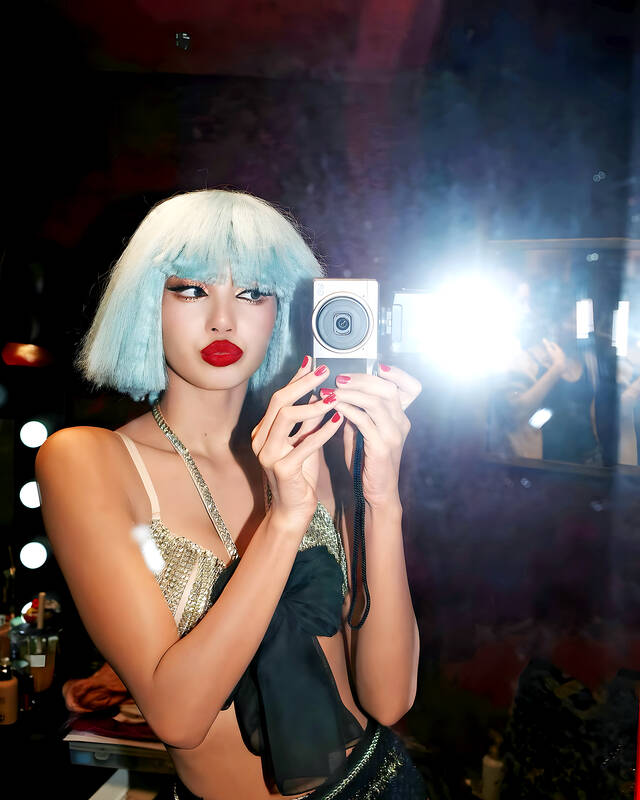There has been significant debate after Lisa, a member of the massively popular K-pop girl group BLACKPINK, performed in Paris’s Crazy Horse show in September 2023. Established in 1951, Crazy Horse has become a symbol of Parisian nightlife, renowned for its innovative performances. This cabaret, blending female nudity with complex lighting, elaborate sets and dance, walks a delicate line between artistic expression and risque content. Though such a stage may be accustomed to controversy, Lisa’s appearance has brought a new intensity to the discussion.
Critics, quick to express their disapproval, contend that Lisa’s participation in the show amplifies the issue of women’s objectification. Her decision sharply conflicts with BLACKPINK’s emphasis on female strength and self-reliance. Furthermore, critics claim her involvement in a show recognized for its erotic and seductive themes diminishes her status as a role model, especially among adolescent fans. Due to her association with the show, Lisa experienced significant consequences; not only was her official Weibo account blocked, but several brands she represented also withdrew their support, deleting any posts associated with her.
In contrast, advocates for artistic liberty and personal freedom praised Lisa for embracing creative diversity and challenging the conventional standards often imposed on female artists, especially in the K-pop industry. Acknowledging her creativity without moral judgments, they firmly support the notion that sovereignty over one’s body and choices warrants respect. Were society more forward-thinking, performances like these would be considered inspiring instead of demeaning.

Photo: Wikimedia Commons / 照片:維基共享資源提供
Although the world of art often conflicts with societal standards, the controversy surrounding Lisa extends beyond her individual involvement to broader societal perspectives on female autonomy and gender norms. This situation highlights that continuous, transparent, and respectful dialogues are of great importance in creating a more harmonious society.
廣受歡迎的韓國流行音樂女團 BLACKPINK的成員Lisa,於西元 2023 年9 月在巴黎瘋馬秀上表演後,引發廣泛爭論。瘋馬秀成立於西元 1951 年,已成為巴黎夜生活的象徵,以其創新表演聞名。這家歌舞表演場所將女性裸露與複雜的燈光、精心設計的舞台和舞蹈融合在一起,遊走在藝術展現與大尺度內容的邊緣。儘管這類舞台可能已習慣爭議,但Lisa的出現為討論帶來新的強度。
批評者迅速表達了他們的不滿,認為Lisa參與這個秀加劇了女性物化的問題。她的決定與BLACKPINK強調女性力量和自立自強明顯自相矛盾。此外,批評者聲稱,她參與了一個以其色情和誘惑主題而聞名的表演,損害了她作為榜樣的地位,特別是在青少年粉絲中。由於她與這個表演的合作,Lisa經歷了嚴重的後果;不僅她的官方微博帳號被封鎖,她代言的幾個品牌也撤回了支持,刪除了與她有關的任何貼文。
相比之下,藝術自由和個人自由的擁護者讚揚Lisa擁抱創意多樣性,並挑戰了那些經常被加諸於女藝術家的傳統標準,尤其是在韓國的流行音樂文化產業。他們在不做出道德批判的狀況下認可她的創造力,並堅定地支持這樣一個觀點,即對自己身體和選擇的主權應該得到尊重。如果社會更具前瞻性,這樣的表演將被視為鼓舞人心而非貶低性的。
雖然藝術世界經常與社會標準相衝突,但圍繞Lisa的爭議超出了她個人參與的範疇,涉及了更廣泛的社會對女性自主權和性別規範的觀點。這種情況凸顯了持續、透明和尊重的對話對於創造一個更加和諧的社會至關重要。
MORE INFORMATION
cabaret n. 有歌舞表演的餐廳或酒館;歌舞表演
nudity n. 裸體;裸露
risque adj. 有傷風化的;情色的
objectification n. 物化(指把人當成物品看待、使用)
erotic adj. 色情的
seductive adj. 誘惑的;誘人的
warrant vt. 值得;使有必要
demeaning adj. 貶低的;羞辱的
KEY VOCABULARY
1. renowned adj. 著名的;有聲望的
Millions of tourists visit the area’s renowned temples each year.
每年有數百萬名遊客造訪這個地區著名的寺廟。
2. accustomed adj. 習以為常的;習慣的
Dave is accustomed to fancy clothes, expensive hotels and rich food.
戴夫對華麗的服飾、昂貴的飯店和山珍海味感到習以為常。
3. controversy n. 爭議;爭論
There is a great deal of controversy in the US over whether people should be allowed to own lots of guns. 美國存在著許多關於是否應該准許人們擁有大量槍枝的爭論。
4. amplify vt. 擴大;增強;放大(聲音)
The mother’s concerns for her son were amplified when he didn’t contact her for two weeks.
這位媽媽對她兒子的擔憂在他兩週都沒聯繫她時更加嚴重了。
5. reliance n. 依賴;信任; self-reliance n. 自力更生;依靠自己
Your reliance on one technique makes your paintings look too similar; you should try some new styles.
你對一種技術的依賴會讓你的畫作看起來都很像;你應該嘗試一些新風格。
6. adolescent adj. 青少年的;青春期的
The magazine is mostly aimed at adolescent readers, but some adults read it, too.
這本雜誌主要針對青少年讀者,但也有一些成年人閱讀。
7. notion n. 觀念;看法
I don’t know where you got the notion that Dan and Doug are friends, because they actually hate each other.
我不知道你從哪得到丹和道格是朋友的想法,因為他們其實很討厭彼此。
8. sovereignty n. 主權;統治權
Several countries are fighting for sovereignty over the disputed islands.
好幾個國家正在爭奪有爭議島嶼的主權。
9. perspective n. 觀點;想法
Jenny’s perspective on this problem would be worth hearing; she has experience with it. 珍妮對這個問題的看法值得一聽;她有相關經驗。
學習音檔: https://magazine.english4u.net/Magdata/menu/vtnnc
《空中美語》雜誌APP免費下載: https://www.english4u.net/apps/index.aspx
免費收聽當月《空中美語》雜誌課文朗讀及解析 !
文章由AMC空中美語授權使用: https://www.english4u.net

In an effort to fight phone scams, British mobile phone company O2 has introduced Daisy, an AI designed to engage phone con artists in time-wasting conversations. Daisy is portrayed as a kindly British granny, exploiting scammers’ tendency to target the elderly. Her voice, based on a real grandmother’s for authenticity, adds to her credibility in the role. “O2” has distributed several dedicated phone numbers online to direct scammers to Daisy instead of actual customers. When Daisy receives a call, she translates the scammers’ spoken words into text and then responds to them accordingly through a text-to-speech system. Remarkably, Daisy

Bilingual Story is a fictionalized account. 雙語故事部分內容純屬虛構。 Emma had reviewed 41 resumes that morning. While the ATS screened out 288 unqualified, she screened for AI slop. She could spot it a mile away. She muttered AI buzzwords like curses under her breath. “Team player.” “Results-driven.” “Stakeholder alignment.” “Leveraging core competencies.” Each resume reeked of AI modeling: a cemetery of cliches, tombstones of personality. AI wasn’t just changing hiring. It was draining the humanity from it. Then she found it: a plain PDF cover letter. No template. No design flourishes. The first line read: “I once tried to automate my

Every May 1, Hawaii comes alive with Lei Day, a festival celebrating the rich culture and spirit of the islands. Initiated in 1927 by the poet Don Blanding, Lei Day began as a tribute to the Hawaiian custom of making and wearing leis. The idea was quickly adopted and officially recognized as a holiday in 1929, and leis have since become a symbol of local pride and cultural preservation. In Hawaiian culture, leis are more than decorative garlands made from flowers, shells or feathers. For Hawaiians, giving a lei is as natural as saying “aloha.” It shows love and

1. 他走出門,左右看一下,就過了馬路。 ˇ He walked outside, looked left and right, and crossed the road. χ He walked outside and looked left and right, crossed the road. 註︰並列連接詞 and 在這句中連接三個述語。一般的結構是 x, y, and z。x and y and z 是加強語氣的結構,x and y, z 則不可以。 2. 他們知道自己的弱點以及如何趕上其他競爭者。 ˇ They saw where their weak points lay and how they could catch up with the other competitors. χ They saw where their weak points lay and how to catch up with the other competitors. 註:and 一般連接同等成分,結構相等的單詞、片語或子句。誤句中 and 的前面是子句,後面是不定詞片語,不能用 and 連接,必須把不定詞片語改為子句,and 前後的結構才相等。 3. 她坐上計程車,直接到機場。 ˇ She took a cab, which took her straight to the airport. ˇ She took a cab and it took her straight